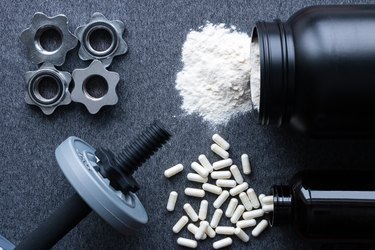
Pre-workout supplements are a popular way for bodybuilders, athletes, and other fitness aficionados to get an extra boost before a workout. Whether you've taken pre-workout supplements for a while or are trying for the first time, you might wonder, when is the right time to take a pre-workout break?
Tip
If your pre-workout supplement seems less effective than it was in the beginning, it might be time to cycle off and give your body a break. Be especially cautious of habit-forming stimulants.
Video of the Day
There is no single recommended schedule for cycling on and off pre-workout supplements, but there are some factors you can consider in your plan. Always check with a doctor before starting a new dietary supplement, especially if you take any medication.
Video of the Day
Check Your Pre-workout Supplement Ingredients
Whether or not you decide to cycle off pre-workout supplements will depend on the ingredients in your chosen blend. While none of the five best pre-workout supplements have extensive long-term use studies, all are considered generally safe. Many supplements, however, contain a blend of ingredients, including vitamins, minerals, proteins, amino acids and herbal ingredients.
Amino acids make up most of the popular pre-workout supplement ingredients — think creatine, alanine, citrulline and the branched-chain amino acids (BCAAs) leucine, isoleucine and valine. Amino acids are the building blocks of protein. Some amino acids are endogenous, like creatine and beta-alanine, which means the body can produce them.
Others you have to consume, which is why eating protein is so important! These are called "essential amino acids" and there are nine of them, including all three BCAAs. The body requires these amino acids to perform many vital functions, including repair and building up new muscle mass in response to exercise. In other words, it makes a lot of sense to take amino acids before a high-intensity workout.
Read more: Protein Vs. Creatine for Muscle Gain
Does Your Supplement Contain Stimulants?
The most important ingredients on the label to look for are stimulants. Many pre-workout supplements contain caffeine or alternatives like guarana, or less safe options like ephedra or yohimbe. A 2016 report in Drug Testing and Analysis found that many supplements have inaccurate information about the content and risks of yohimbe on their labels.
Even caffeine can cause side effects in high enough doses or with long-term use. According to a 2015 report in Current Pharmacology, despite the proven benefits of caffeine to athletes, users can develop both a tolerance to and a dependency on the substance.
Read more: How Do Caffeine Pills Affect the Body?
Watch out for miraculous claims of "easy, effortless" body composition changes and don't be swayed by promises of unrealistic fat loss or muscle gain. These kinds of diet pills may contain unsafe, untested, even unlisted pharmaceutical ingredients that could cause serious harm. The same goes for "natural testosterone boosters" and similar supplements.
A 2019 study in the Journal of Sexual Medicine found that the top supplements on Amazon all lacked definitive evidence that they work, and the FDA does not require dietary supplements to be proven safe or that the claims of its effects be proven true before marketing the item to consumers.
When to Cycle Off Supplements
People who are bodybuilding cycle supplements on or off, or change up their blend, during different phases to get cycle-specific results. Many people use creatine on a cutting cycle in doses to help maintain muscle mass while burning fat, for example.
Creatine is more effective for shorter, higher-intensity workouts focused on muscle-building, according to a July 2012 comprehensive review in the Journal of the International Society of Sports Nutrition. You definitely don't have to take your pre-workout supplements every day, or even before every workout.
Read more: Side Effects of Stopping Creatine
You and your health team can make the best decisions about when it's time to take a pre-workout break. Consult a doctor before you start, so she can help you determine which pre-workout supplements are safe and plan your doses and cycles from there.
- U.S. National Library of Medicine: "Creatine"
- Journal of the International Society of Sports Nutrition: "International Society of Sports Nutrition Position Stand—Safety and Efficacy of Creatine Supplementation in Exercise, Sport, and Medicine"
- Journal of the International Society of Sports Nutrition: "International Society of Sports Nutrition Position Stand—Beta-Alanine"
- U.S. National Library of Medicine: "Protein in Diet"
- U.S. National Library of Medicine: "Guarana"
- U.S. National Library of Medicine: "Ephedra"
- National Center for Complementary and Integrative Health: "Yohimbe"
- Drug Testing and Analysis: "Pharmaceutical Quantities of Yohimbine Found in Dietary Supplements in the USA"
- U.S. National Library of Medicine: "Caffeine"
- Current Neuropharmacology: "Caffeine: Cognitive and Physical Performance Enhancer or Psychoactive Drug?"
- National Center for Complementary and Integrative Health: "Using Dietary Supplements Wisely"
- Journal of Sexual Medicine: "Testosterone Imposters—An Analysis of Popular Online Testosterone Boosting Supplements"
- U.S. Food and Drug Administration: "FDA 101—Dietary Supplements"
- Journal of the International Society of Sports Nutrition: "Creatine Supplementation With Specific View to Exercise/Sports Performance—an Update"
- National Institute of Health: "Dietary Supplements for Exercise and Athletic Performance"
- U.S. National Library of Medicine: "Amino Acids"